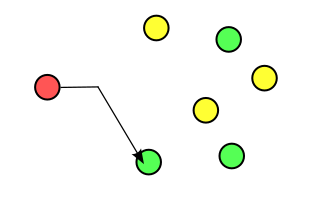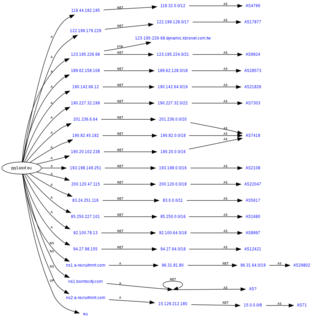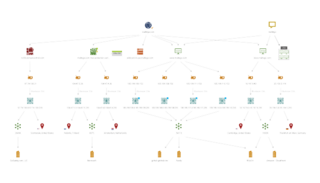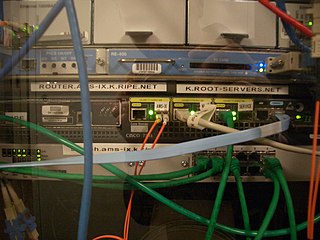 W
WA domain name is an identification string that defines a realm of administrative autonomy, authority or control within the Internet. Domain names are used in various networking contexts and for application-specific naming and addressing purposes. In general, a domain name identifies a network domain, or it represents an Internet Protocol (IP) resource, such as a personal computer used to access the Internet, a server computer hosting a website, or the web site itself or any other service communicated via the Internet. In 2017, 330.6 million domain names had been registered.
 W
WAnycast is a network addressing and routing methodology in which a single destination IP address is shared by devices in multiple locations. Routers direct packets addressed to this destination to the location nearest the sender, using their normal decision-making algorithms, typically the lowest number of BGP network hops. Anycast routing is widely used by content delivery networks such as web and DNS hosts, to bring their content closer to end users.
 W
WA domain name auction facilitates the buying and selling of currently registered domain names, enabling individuals to purchase a previously registered domain that suits their needs from an owner wishing to sell. A Drop registrar offers sales of expiring domains; but with a domain auction there is no need to wait until a current owner allows the registration to lapse before purchasing the domain you most want to own. Domain auction sites allow users to search multiple domain names that are listed for sale by owner, and to place bids on the names they want to purchase. As in any auction, the highest bidder wins. The more desirable a domain name, the higher the winning bid, and auction sites often provide links to escrow agents to facilitate the safe transfer of funds and domain properties between the auctioning parties.
 W
WThe 2016 Dyn cyberattack was a series of distributed denial-of-service attacks on October 21, 2016, targeting systems operated by Domain Name System (DNS) provider Dyn. The attack caused major Internet platforms and services to be unavailable to large swathes of users in Europe and North America. The groups Anonymous and New World Hackers claimed responsibility for the attack, but scant evidence was provided.
 W
WFast flux is a DNS technique used by botnets to hide phishing and malware delivery sites behind an ever-changing network of compromised hosts acting as proxies. It can also refer to the combination of peer-to-peer networking, distributed command and control, web-based load balancing and proxy redirection used to make malware networks more resistant to discovery and counter-measures. The Storm Worm (2007) is one of the first malware variants to make use of this technique.
 W
WA fully qualified domain name (FQDN), sometimes also referred to as an absolute domain name, is a domain name that specifies its exact location in the tree hierarchy of the Domain Name System (DNS). It specifies all domain levels, including the top-level domain and the root zone. A fully qualified domain name is distinguished by its lack of ambiguity: it can be interpreted only in one way. It usually consists of a host name and at least one higher-level domain (label) separated by the symbol "." and always ends in the top-level domain.
 W
WThe Internet Corporation for Assigned Names and Numbers is an American multistakeholder group and nonprofit organization responsible for coordinating the maintenance and procedures of several databases related to the namespaces and numerical spaces of the Internet, ensuring the network's stable and secure operation. ICANN performs the actual technical maintenance work of the Central Internet Address pools and DNS root zone registries pursuant to the Internet Assigned Numbers Authority (IANA) function contract. The contract regarding the IANA stewardship functions between ICANN and the National Telecommunications and Information Administration (NTIA) of the United States Department of Commerce ended on October 1, 2016, formally transitioning the functions to the global multistakeholder community.
 W
WThe Stop Online Piracy Act (SOPA) and PROTECT IP Act (PIPA) have found broad support from organizations that rely on copyright, including the Motion Picture Association of America, the Recording Industry Association of America, Macmillan Publishers, Viacom, and various other companies and unions in the cable, movie, and music industries.
 W
WMaltego is software used for open-source intelligence and forensics, developed by Paterva from Pretoria, South Africa. Maltego focuses on providing a library of transforms for discovery of data from open sources, and visualizing that information in a graph format, suitable for link analysis and data mining. As of 2019, the team of Maltego Technologies headquartered in Munich, Germany has taken responsibility for all global customer-facing operations.
 W
WMicrosoft Corp. v. Shah was an Anticybersquatting Consumer Protection Act (ACPA) case heard before the United States District Court for the Western District of Washington. Microsoft sued the defendants, Amish Shah and others, for, among other charges, contributory cybersquatting for encouraging others, through videos and software, to infringe on Microsoft's trademarks. The case was settled out of court in July 2011 after judge Ricardo S. Martinez denied Shah's motion for dismissal. Legal observers suggested that, if upheld, the case would prove notable for the court's expansion of the ACPA liability to include contributory cybersquatting.
 W
WOpenNIC is a user-owned and -controlled top-level Network Information Center that offers a non-national alternative to traditional top-level domain (TLD) registries such as ICANN. As of January 2017, OpenNIC recognizes and peers all existing ICANN TLDs, for compatibility reasons. However, OpenNIC has not yet evaluated and does not hold a formal position on future ICANN TLDs.
 W
WPlanned Parenthood Federation of America, Inc. v. Bucci, 42 U.S.P.Q.2d 1430, an early Internet domain trademark infringement case heard in the United States District Court for the Southern District of New York, established the theory that hosting a site under a domain name that was the registered trademark of a third party constituted trademark infringement. The case was also important in determining what constitutes "Use in Commerce" under the Lanham Act in cyberspace. Although these holdings were modified and overruled by various American courts following the decision, Bucci stands as a seminal case for being one of the first cases to address these issues.
 W
WA root name server is a name server for the root zone of the Domain Name System (DNS) of the Internet. It directly answers requests for records in the root zone and answers other requests by returning a list of the authoritative name servers for the appropriate top-level domain (TLD). The root name servers are a critical part of the Internet infrastructure because they are the first step in translating (resolving) human readable host names into IP addresses that are used in communication between Internet hosts.
 W
WThe Stop Online Piracy Act (SOPA) was a controversial United States bill introduced on October 26, 2011, by U.S. Representative Lamar S. Smith (R-TX) to expand the ability of U.S. law enforcement to combat online copyright infringement and online trafficking in counterfeit goods. Provisions included the requesting of court orders to bar advertising networks and payment facilities from conducting business with infringing websites, and web search engines from linking to the websites, and court orders requiring Internet service providers to block access to the websites. The proposed law would have expanded existing criminal laws to include unauthorized streaming of copyrighted content, imposing a maximum penalty of five years in prison.
 W
WThe Trademark Clearinghouse is a database of validated and registered trademarks established by ICANN to assist trademark holders prevent infringing behavior in the Domain Name System. In combination with the Uniform Rapid Suspension System (URS), it is the second significant attempt by ICANN to handle the "Trademark Dilemma". The first attempt was the Uniform Domain-Name Dispute-Resolution Policy.
 W
WVerisign Inc. is an American company based in Reston, Virginia, United States that operates a diverse array of network infrastructure, including two of the Internet's thirteen root nameservers, the authoritative registry for the .com, .net, and .name generic top-level domains and the .cc and .tv country-code top-level domains, and the back-end systems for the .jobs, .gov, and .edu top-level domains. Verisign also offers a range of security services, including managed DNS, distributed denial-of-service (DDoS) attack mitigation and cyber-threat reporting.
 W
WThe ZA Central Registry (ZACR), formerly known as UniForum SA, is a non-profit organisation established in 1988 and operates various second-level domains (SLD's) in South Africa. The ZA Central Registry is the administrator of the South African zones such as "co.za" and "web.za". Their offices are based in Midrand, South Africa.
 W
W